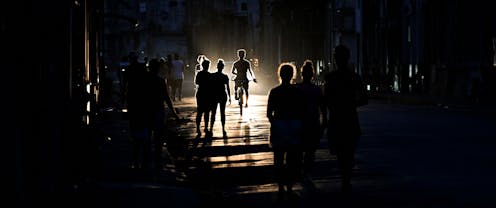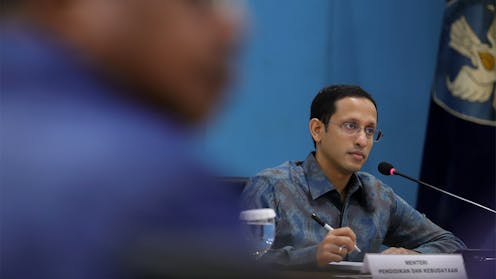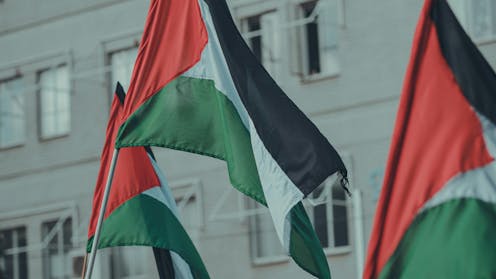Cuba’s leaders see their options dim amid blackouts and a shrinking economy
- Written by Joseph J. Gonzalez, Associate Professor of Global Studies, Appalachian State University

The lights went out in Cuba again.
For the fifth time[1] in a year, all of Cuba plunged into darkness[2] on Sept. 10, 2025. Even critical emergency services like hospitals[3] suffered during the nearly 24-hour power outage.
That’s because Cuba’s power grid is old and hard to maintain[4], and the country cannot afford to import all the oil[5] it needs to keep the lights on.
As a scholar of Cuban society and politics[6], I believe that the ongoing blackouts point to larger economic problems facing the country. While much of that is due to the continuing effects of the U.S. embargo[7], which since 1960 has obstructed American trade and tourism with the Caribbean island, Cuba’s leaders also deserve a share of the blame for their economic mismanagement.
Indeed, while other nominally communist countries, such as Vietnam and China, have facilitated the development of a private sphere[8] in their economies in the past several decades, officials in Havana have in practice restricted such growth[9] so as not to threaten state enterprises[10].
The result has been a less vibrant, less productive network of private enterprises unable to provide the economic growth[11] that Cuba so desperately needs. All the while, Cuba’s communist government faces an existential threat[12] as it struggles to maintain power in the face of popular discontent.
The external factors of the crisis
Since 2020, Cuba’s gross domestic product has shrunk by almost[13] 11%, with economists forecasting a further decline[14] of 1%-2% in 2025.
There are a number of reasons for this decline.
Tourism, Cuba’s lifeblood, has not rebounded[15] since the COVID-19 pandemic. Meanwhile, Venezuela, which subsidized Cuba for a decade in the 2000s, particularly with oil exports[16], no longer has the capacity[17] to do so. Further, persistent energy shortages in Cuba have led to steep declines in agricultural[18] and industrial[19] production.
From a broader perspective, the U.S. embargo also continues to harm the Cuban economy. For more than 60 years[21], Cubans have been unable to sell their products[22] to the United States – and Americans have been unable[23] to travel to or do business with[24] Cuba outside of very limited categories.
Estimates vary as to what extent[25] the embargo damages the Cuban economy, but it seems certain that the “blockade,” as Cubans call it, deprives the nation of at least hundreds of millions[26], if not billions, of U.S. dollars in trade every year, most particularly in agriculture[27] and tourism[28].
Steps toward domestic reform
While external factors have taken a toll, the persistent economic difficulties facing Cubans are also self-inflicted by the government.
Cuba’s leaders have pursued a slow[29], narrow[30] and sometimes arbitrary[31] path toward economic privatization – especially when contrasted with other officially communist countries in Asia.
Following Fidel Castro’s departure from public life in 2008, Cuba’s subsequent leader, and Fidel’s brother, Raul Castro, announced a series of gradual steps[32] intended to encourage private enterprise that had long been curtailed by the government.
Under Raul, the state allowed Cubans to own, buy and sell their homes[33]; they could also create their own[34] businesses, and even employ others[35] to whom they were not related – practices prohibited under Fidel Castro.
The government also allowed more foreigners to invest in Cuba[36], principally in tourist infrastructure[37], provided they confined themselves to minority stakes[38].
Cubans were also permitted for the first time in decades to own their own land, grow food and sell it at markets[39], setting their own prices[40] within limits. Collective farms, the bane of Soviet agriculture that had once inspired Fidel’s revolutionary visions, were no longer[41] the norm.
By 2017, about 13% of the workforce[42] held licenses to start businesses, while the private sector employed about one-third[43] of all workers.
In the years immediately following these reforms, Cuba posted some gains in industrial[44] and food production[45] and GDP. Indeed, during the mid-2000s, Cuba posted impressive growth rates[46], sometimes in excess of 10%.
Domestic progress stalled
Unfortunately for Cubans, the upward trend did not continue.
And that is in no small measure due to Cuba’s prosperity in the 2000s being built on Venezuelan subsidies, not by Cuban entrepreneurs.
Venezuela’s late president, and longtime Castro admirer, Hugo Chavez, began to subsidize Fidel Castro’s government[47] shortly after taking power in 1999.
A petrostate, Venezuela provided much-needed oil to Cuba on favorable terms[48], while also paying the Cuban nation[49] for doctors to work in Venezuela’s hospitals and clinics, providing Cuba with the hard currency it needed[50] to pay for imports.
Researchers estimate that the Venezuelan government subsidized the Cuban economy by as much as US$9 billion[51] per year until 2016.
Venezuelan oil allowed Cuba to paper over a starker reality: Despite reforms, Cuba’s entrepreneurs remained hamstrung by a cumbersome and often corrupt state policy[52].
Thanks to ever-changing regulations, the majority of private businesses have remained small[53] and dedicated to personal services, such as restaurants, hairdressing, seamstressing and repairs.
On a larger scale, Cuba’s state bureaucrats see competition with government-owned businesses[54], especially in tourism, as a threat to their power and privileges. Taxes also remain inequitably high[55] for private firms.
Meanwhile, the larger private businesses that are now occasionally permitted[56] are almost always, according to a number of my Cuban-based sources, connected to friends or family members of the political elite, not average Cubans.
There have been successes, to be sure. The private sector now accounts for more retail sales[57] by volume than state enterprises.
But the percentage of the workforce[58] employed by the private sector remains about what it was in 2019, while private enterprise accounts for only about 15% of Cuba’s GDP[59].
The unsustainable present
Confronting multiple crises, Cuba’s leaders continue to blame the U.S. embargo[60] and policy from Washington that has become only more bellicose under President Donald Trump. No doubt drawing optimism from having weathered severe crises[61] before, the Cuban government seems committed to a state of defiance.
But the evidence this time around suggests Havana’s leaders should be less sanguine.
Despite increasing costs[62], Cubans enjoy widespread access to the internet and they know[63] just how bad and how inequitable things are.
For all the government’s rhetoric and commitment to a decades-old revolution, Cubans see a much-vaunted medical system that is failing, unable to provide drugs, procedures — or even electricity. They know that crime is on the rise, while inflation reduces the value of the Cuban peso relative to the dollar every week[64][65][66][67]
Cubans see and hear of their well-connected countrymen[69], with links to state enterprises, flaunting their wealth. Cubans may also know that their military holds as much as US$18 billion abroad[70] — about 16% of Cuba’s GDP in 2024.
What they certainly know and experience is the reality of being forced to live without power, with no possibility of improvement in sight.
Limited choices going forward
Historically, Cuba has been pulled from crises by foreign patrons[71] willing to subsidize its revolution.
But Russia’s strategic position, China’s global priorities and Venezuela’s hardships[72] all make that unlikely right now. And with the U.S. now pursuing a policy of maximum pressure against noncompliant governments in Latin America, Havana can rest assured that it will see little breathing room from its powerful neighbor and long-time antagonist.
That leaves the Cuban government with only a few options.
It could choose to continue trying to restrict[73] its citizens’ access to the internet. Unfortunately for the state, the internet[74] is the lifeblood of the private sector.
Cuba’s leaders could also choose to rely on the loyalty of its security forces and their ability to intimidate and abuse their fellow Cubans. That has worked in the past[75], but given Havana’s scarce resources and its limited capacity to reward its henchmen, it is not clear that the government can afford to adopt this approach indefinitely.
Of course, Cuba’s leaders could take steps toward further reform the private sector and eliminate the waste and corruption that have increasingly defined the Cuban state.
Such a course would require the government to permit all Cubans, not just a well-connected few, to compete with state enterprises. It would also mean allowing for a greater degree of foreign investment, which has remained stunted[76] due to government policy.
If the past offers any guide, however, Havana will instead continue to rely on its formidable security[77] apparatus to repress is citizens, while privatizing in ways that do not threaten the power and privileges of the elite.
References
- ^ fifth time (www.theguardian.com)
- ^ plunged into darkness (www.reuters.com)
- ^ critical emergency services like hospitals (en.cibercuba.com)
- ^ old and hard to maintain (www.npr.org)
- ^ all the oil (en.cibercuba.com)
- ^ scholar of Cuban society and politics (interdisciplinary.appstate.edu)
- ^ U.S. embargo (horizontecubano.law.columbia.edu)
- ^ development of a private sphere (developingeconomics.org)
- ^ have in practice restricted such growth (www.reuters.com)
- ^ threaten state enterprises (en.cibercuba.com)
- ^ the economic growth (americasquarterly.org)
- ^ faces an existential threat (www.e-ir.info)
- ^ has shrunk by almost (www.reuters.com)
- ^ forecasting a further decline (indepthnews.net)
- ^ has not rebounded (latinamericareports.com)
- ^ particularly with oil exports (translatingcuba.com)
- ^ has the capacity (www.caracaschronicles.com)
- ^ agricultural (rumporter.com)
- ^ industrial (horizontecubano.law.columbia.edu)
- ^ Yamil Lage/AFP via Getty Images (www.gettyimages.com)
- ^ more than 60 years (www.state.gov)
- ^ unable to sell their products (www.wola.org)
- ^ have been unable (cu.usembassy.gov)
- ^ do business with (globalsanctions.com)
- ^ as to what extent (horizontecubano.law.columbia.edu)
- ^ at least hundreds of millions (www.bellyofthebeastcuba.com)
- ^ agriculture (www.ers.usda.gov)
- ^ tourism (www.riotimesonline.com)
- ^ slow (thecubaneconomy.com)
- ^ narrow (horizontecubano.law.columbia.edu)
- ^ arbitrary (horizontecubano.law.columbia.edu)
- ^ announced a series of gradual steps (ips-dc.org)
- ^ own, buy and sell their homes (www.bbc.com)
- ^ create their own (www.theguardian.com)
- ^ employ others (www.bbc.com)
- ^ invest in Cuba (www.brookings.edu)
- ^ tourist infrastructure (horizontecubano.law.columbia.edu)
- ^ minority stakes (www.cubatrade.org)
- ^ own their own land, grow food and sell it at markets (en.unav.edu)
- ^ own prices (www.nbcnews.com)
- ^ no longer (cubaplatform.org)
- ^ 13% of the workforce (www.miamiherald.com)
- ^ one-third (horizontecubano.law.columbia.edu)
- ^ industrial (www.usgs.gov)
- ^ food production (tri.yale.edu)
- ^ impressive growth rates (www.worldometers.info)
- ^ subsidize Fidel Castro’s government (www.wilsoncenter.org)
- ^ favorable terms (www.cnn.com)
- ^ paying the Cuban nation (www.bbc.com)
- ^ hard currency it needed (www.usnews.com)
- ^ as much as US$9 billion (www.nytimes.com)
- ^ a cumbersome and often corrupt state policy (www.nbcnews.com)
- ^ have remained small (horizontecubano.law.columbia.edu)
- ^ competition with government-owned businesses (www.caribbean-council.org)
- ^ inequitably high (www.miamiherald.com)
- ^ occasionally permitted (en.unav.edu)
- ^ more retail sales (www.reuters.com)
- ^ percentage of the workforce (americasquarterly.org)
- ^ 15% of Cuba’s GDP (www.nytimes.com)
- ^ blame the U.S. embargo (www.reuters.com)
- ^ having weathered severe crises (ecollections.law.fiu.edu)
- ^ increasing costs (www.reuters.com)
- ^ know (en.cibercuba.com)
- ^ medical system that is failing (www.paho.org)
- ^ crime is on the rise (www.bbc.com)
- ^ inflation reduces (www.reuters.com)
- ^ every week (www.reuters.com)
- ^ Yamil Lage/AFP via Getty Images (www.gettyimages.com)
- ^ well-connected countrymen (www.e-ir.info)
- ^ US$18 billion abroad (www.miamiherald.com)
- ^ foreign patrons (theconversation.com)
- ^ Venezuela’s hardships (www.caracaschronicles.com)
- ^ trying to restrict (english.elpais.com)
- ^ internet (english.elpais.com)
- ^ worked in the past (www.yahoo.com)
- ^ has remained stunted (www.investopedia.com)
- ^ formidable security (raceandequality.org)
Authors: Joseph J. Gonzalez, Associate Professor of Global Studies, Appalachian State University




